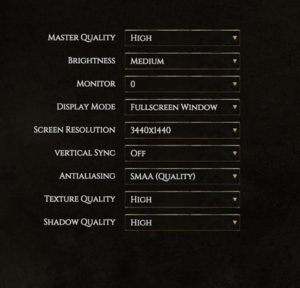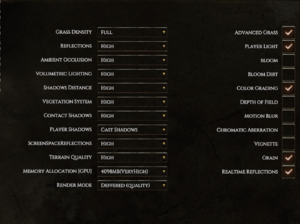Last Epoch
From PCGamingWiki, the wiki about fixing PC games
Although this product has been released, it remains under active development - information may change frequently and could be outdated or irrelevant.
 |
|
| Developers | |
|---|---|
| Eleventh Hour Games | |
| Engines | |
| Unity | |
| Release dates | |
| Windows | February 21, 2024 |
| macOS (OS X) | Cancelled[1] |
| Linux | February 21, 2024 |
| Taxonomy | |
| Monetization | One-time game purchase |
| Microtransactions | Currency, Unlock |
| Modes | Singleplayer, Multiplayer |
| Pacing | Real-time |
| Perspectives | Bird's-eye view |
| Controls | Direct control |
| Genres | ARPG |
| Themes | Fantasy |
Last Epoch is a singleplayer and multiplayer bird's-eye view ARPG game.
After the Kickstarter campaign started on April 17, 2017, the first alpha builds were available in August 2018. The game entered early access on Steam on April 30, 2019. The full release followed on February 21, 2024.
General information
Availability
| Source | DRM | Notes | Keys | OS |
|---|---|---|---|---|
| Steam | Drm-free when launched directly from the executable with the --offline argument. Modes other than true offline require Steam and a Last Epoch account to play |
Game data
Configuration file(s) location
| System | Location |
|---|---|
| Windows | HKEY_CURRENT_USER\SOFTWARE\Eleventh Hour Games\Last Epoch |
| Linux |
- It's unknown whether this game follows the XDG Base Directory Specification on Linux. Please fill in this information.
Save game data location
| System | Location |
|---|---|
| Windows | %USERPROFILE%\AppData\LocalLow\Eleventh Hour Games\Last Epoch\Saves |
| Linux | $HOME/.config/unity3d/Eleventh Hour Games/Last Epoch/Saves |
Save game cloud syncing
| System | Native | Notes |
|---|---|---|
| Steam Cloud |
Video
| Graphics feature | State | Notes | |
|---|---|---|---|
| Widescreen resolution | |||
| Multi-monitor | |||
| Ultra-widescreen | Native support. | ||
| 4K Ultra HD | |||
| Field of view (FOV) | |||
| Windowed | |||
| Borderless fullscreen windowed | |||
| Anisotropic filtering (AF) | See the glossary page for potential workarounds. | ||
| Anti-aliasing (AA) | Off, FXAA, SMAA. | ||
| Vertical sync (Vsync) | On, Half, Off. | ||
| 60 FPS and 120+ FPS | |||
| High dynamic range display (HDR) | |||
- The game engine may allow for manual configuration of the game via its variables. See the Unity page for more details.
Input
| Keyboard and mouse | State | Notes |
|---|---|---|
| Remapping | ||
| Mouse acceleration | ||
| Mouse sensitivity | ||
| Mouse input in menus | ||
| Mouse Y-axis inversion | ||
| Controller | ||
| Controller support | ||
| Full controller support | ||
| Controller remapping | ||
| Controller sensitivity | ||
| Controller Y-axis inversion |
| Controller types |
|---|
| XInput-compatible controllers | ||
|---|---|---|
| Xbox button prompts | ||
| Impulse Trigger vibration |
| PlayStation controllers |
|---|
| Generic/other controllers |
|---|
| Additional information | ||
|---|---|---|
| Controller hotplugging | ||
| Haptic feedback | ||
| Digital movement supported | ||
| Simultaneous controller+KB/M |
Audio
| Audio feature | State | Notes |
|---|---|---|
| Separate volume controls | ||
| Surround sound | ||
| Subtitles | ||
| Closed captions | ||
| Mute on focus lost | ||
| Royalty free audio |
Localizations
| Language | UI | Audio | Sub | Notes |
|---|---|---|---|---|
| English | ||||
| Simplified Chinese | ||||
| French | ||||
| German | ||||
| Korean | ||||
| Polish | ||||
| Brazilian Portuguese | ||||
| Russian | ||||
| Spanish |
Network
Multiplayer types
| Type | Native | Notes | |
|---|---|---|---|
| LAN play | |||
| Online play | |||
Other information
API
| Executable | 32-bit | 64-bit | Notes |
|---|---|---|---|
| Windows | |||
| macOS (OS X) | macOS support was discontinued on October 23, 2020.[1] | ||
| Linux |
System requirements
| Windows | ||
|---|---|---|
| Minimum | Recommended | |
| Operating system (OS) | 7 | 10 |
| Processor (CPU) | Intel Core i5-2500 AMD FX-4350 |
Intel Core i5-6500 AMD Ryzen 3 1200 |
| System memory (RAM) | 8 GB | 16 GB |
| Hard disk drive (HDD) | 22 GB | |
| Video card (GPU) | Nvidia GeForce GTX 1060 AMD Radeon RX 580 6 GB of VRAM DirectX 11 compatible | Nvidia GeForce RTX 3060 AMD Radeon RX 6600 XT |
| Other | SSD strongly recommended | |
- A 64-bit operating system is required.
| macOS (OS X) | ||
|---|---|---|
| Minimum | Recommended | |
| Operating system (OS) | 10.12 | 10.14 |
| Processor (CPU) | Intel Core i5-2500 AMD FX-4350 |
Intel Core i5-6500 AMD Ryzen 3 1200 |
| System memory (RAM) | 6 GB | 8 GB |
| Hard disk drive (HDD) | 35 GB | |
| Video card (GPU) | Nvidia GeForce GTX 660 Ti AMD Radeon R9 270 2 GB of VRAM | Nvidia GeForce GTX 1060 AMD Radeon RX 480 4 GB of VRAM |
| Linux | ||
|---|---|---|
| Minimum | Recommended | |
| Operating system (OS) | Ubuntu 16.04 | Ubuntu 20.04 |
| Processor (CPU) | Intel Core i5-2500 AMD FX-4350 |
Intel Core i5-6500 AMD Ryzen 3 1200 |
| System memory (RAM) | 8 GB | 16 GB |
| Hard disk drive (HDD) | 22 GB | |
| Video card (GPU) | Nvidia GeForce GTX 1060 AMD Radeon RX 580 6 GB of VRAM | Nvidia GeForce RTX 3060 AMD Radeon RX 6600 XT |
| Other | SSD strongly recommended | |
- A 64-bit operating system is required.
References
- ↑ 1.0 1.1 An Update to Mac Support - Announcements - Last Epoch Forums - last accessed on 2023-03-10
- "We’ve recently had to make a difficult decision regarding the future of our macOS client for Last Epoch due to Apple’s announced upcoming transition to ARM-based Macs [“Apple Silicon”]."




